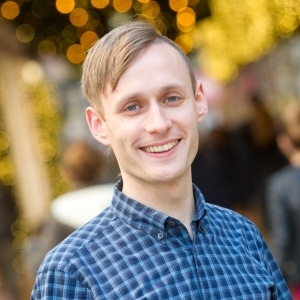Tell us a bit about yourself – what stage of your PhD are you in and what’s your project about?
Post-viva! I’m currently making minor corrections. My viva was in January (2020) and I have three months to get my corrections done. Getting a PhD finished is a series of little victories – I’m not sure when I can consider it truly over. My PhD research is about evaluating eye screening for people with diabetes. The goal is to make sure that everyone gets an invite to screening when they need it – not too soon and not too late. If we can achieve that then we should be able to make screening programmes more efficient, freeing up resources for other parts of the health service. I’m a health economist, so the purpose of my research is to generate evidence that helps decision-makers achieve the best health outcomes possible with the resources available.
What does a typical day or week look like for you?
My PhD took me so long (8 years, part-time) that I had at least six different offices during the course of my studies. And, if you include my home, these were spread across three different cities! So my typical day has changed a lot over the years in terms of my commute and the people around me. But I’ve worked full-time throughout the course of my PhD, so much of my research was done during stolen evenings and weekends – mostly at home. Like many economists, my research involves a lot of time staring at computer screens, analysing data and writing about it. But I do get out sometimes. Having a research job alongside my PhD meant that there were plenty of opportunities to present at conferences and seminars, and I’ve been lucky to visit lots of cool places around the UK and Europe.
What’s one thing that you’ve enjoyed the most during your PhD?
When I first started my PhD and my research job, I immediately felt welcomed by the health economics research community. Becoming a part of that community has been a lot of fun. It’s hard to say how it might have been different if I was a full-time student, but being made to feel part of the club from the get-go makes you feel like you’ve already made it. There’s no pressure to prove your worth. Spending plenty of time with other researchers – both junior and senior – is a great way to boost your confidence and generate new ideas.



What’s been the most challenging part of it?
Finishing it! As a part-time student with a full-time job that I love, there was very little incentive for me to complete my thesis. Maybe on graduation I’ll have the secrets of the universe passed down to me and I’ll realise the importance of those three little letters. But I doubt it. For me, the PhD has been all about the journey. Sure, I want the journey to end, but that’s such a hassle! I’d rather respond to these interview questions than finish my corrections!
Where do you see yourself 5 years after completing your PhD?
I’ll be Professor of Health Economics at the University of Hawaii. Or maybe I’ll still have my current job at the Office of Health Economics. I don’t really mind, so long as I get to keep on designing and conducting research projects that are important and interesting.
What’s one piece of advice that you’d offer students that are thinking of doing a PhD?
If you can, wait for the research question to find you. I worked as a researcher for a year before embarking on my PhD. It was during this time that a tricky problem (what ended up being the title of my thesis) revealed itself. If you’re already steeped in the research as an undergraduate or Masters student, you might be lucky enough to find your calling early. A PhD should address a hard problem, one that you probably can’t solve. If you can, somebody will probably beat you too it, especially if you take as long as I did. Get to know the field first and you’ll start to see where you can add value.
What makes your university a good place to study?

Nottingham has a fantastic collegiate vibe and a beautiful campus, which makes it a place in which you can enjoy spending time. During my eight years as a student, the university has developed its services for postgraduates and there is now a good network that you can plug into. The university also offers better in-house training opportunities than most others that I’ve seen.
What do you enjoy doing in your free time?
I’m guilty of being a researchaholic. In the same year that I started my PhD I started The Academic Health Economists’ Blog. That keeps me busy and I enjoy working with my co-bloggers and discussing the latest research without all the trappings of scholarly publication. But I do maintain a life outside of health economics. When I’m not at the computer you might find me crate digging in a record store or stuffing my face at the newest vegan food outlet. Thanks to research life, I get to do these things in cities around the world!
Want to know more about Chris?
Follow him on Twitter, LinkedIn and ResearchGate, connect with his ORCID and checkout his personal website and his Academic Health Economists’ blog using the links below:
Website | ORCID | ResearchGate | Twitter | LinkedIn | The AHE Blog

